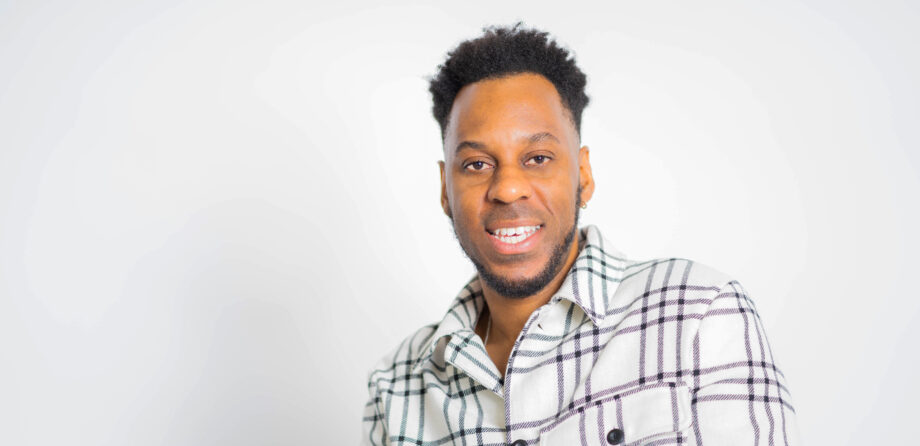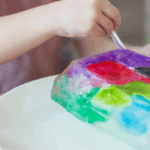
A Q&A with Elliott Rae
Elliott Rae who is opening NDNA’s conference on 7 June is the founder of the parenting platform MusicFootballFatherhood, called the ‘Mumsnet for Dads’ by the BBC.
He is the curator of the bestselling book, DAD, presenter of BBC One documentary ‘Becoming Dad’, co-founder of the Working Dads Employer Awards and creator of the Parenting Out Loud campaign which encourages and working dads to be equal and active parents.
Elliott is the ex-Head of DEI Delivery at HM Treasury and one of the UK’s most prominent speakers on fatherhood, mental health and masculinity. His work on gender equality has been recognised by the United Nations and he was awarded the #HeForShe award by UN Women UK.
NDNA had a conversation with him to find out more about him and his views on fatherhood and why it’s crucial they are enabled to be hands-on dads.
What in your experience is the best thing about becoming a father?
My eight-year-old daughter starting taking care of me when I lost my voice recently, giving me kisses and hugs. I just thought – this is so nice!. You do so much for your child and then they give back that love.
It’s also when you see them learning something and practising hard, then they can finally do it. For example my daughter does martial arts, we see that journey of trying and failing, then finally she can do it. And seeing them being kind to others – if they see someone being picked on and intervene or empathise with someone going through a hard time. You see their character growing and developing.
Have expectations around fathers’ role in childcare evolved? In what ways?
Yes expectations are very different. I talk a lot about our parents’ generation. My dad was a child of the 50s/60s, it was very rare for them to be at the birth of their child. It was not appropriate for a man to be with the mother at this vulnerable and intimate moment. Everything changed in the 70s and 80s, now 96% of dads are at the birth of their children.
My granddad had seven children and he said I would see something he never saw, that’s childbirth. Not only are they now present but also birthing partners and involved in neonatal preparation, a key part of that birthing experience. So it has fundamentally changed from the beginning.
We encourage dads before their children are born to think about what kind of dad they want to be – practical, emotional, physical. What kind of songs will you sing? How will you spend your paternity leave? Will you work flexibly? That shift from one generation is very big.
Dads want to be equal parents and pay a key role in their child’s life, a present figure, a positive one. My dad was the main carer for me and my sister for a year or so when mum went back to work. For that time it was quite progressive, so many men still have lots of barriers. It’s an outdated idea of masculinity to be the bread winner.
There’s been a lot of social change but I don’t think there has been enough regarding policy to encourage that. Shared parental leave was introduced in 2015. Before that, paternity leave came in during 2003. Sharing parental leave has only been in place for nine years, it’s not good enough and not really supporting dads to be equal and active parents. We have so much more to do.
Work is a massive barrier to dads being involved with their children in their early years, but we have seen a social awakening. Dads are realising how important early years and months are for bonding and how that ability to parent sets the foundation for a really close relationship which goes on into adulthood.
I speak with so many dads that are a lot older, such as a Chief Finance Officer of a big company who provided very well for his children but wasn’t around for the first 12 – 14 years because he was working and travelling. He wasn’t around for their early or primary school years, missed swimming lessons. He said when there’s a problem now, the kids call their mum. We hope that children will thrive and flourish and come back to them in adulthood but with the distance between him and his kids, he really regrets that.
It’s a very powerful lesson for all of us. The decisions made in a child’s early years are not just for those years, but have potential to last for their whole life. The social norms are changing so dads CAN be more present early on.
Do you think societal expectations adequately support fathers to have an active role in parenting their children?
There are four main areas here – healthcare, employment, community support and media/social media.
Healthcare of a child starts with the initial visit to the GP and scans, then the birth and home visits. The NHS is underfunded and there’s not always the opportunity to engage expectant and new dads. Some Trusts do better than others. In Manchester, Dads Matter is part of Home Start, integrated support to engage dads through maternity. It helps prepare for fatherhood including mental health support after the birth. A lack of funding means that a lot of the time dads are not engaged as much as they should be – they don’t always get invited to baby groups, and groups don’t always use the right language.
Regarding employment, only 4 – 8% of parents take shared parental leave due to a variety of reasons, affordability can be an issue if the dad is the main earner. It’s also a nuisance to apply for and sometimes the mum needs all the time off to recover.
If men need to be on site at work it can be a barrier to flexible working – it’s easier to do the school pick up if you work in an office. For the 50% working in a face to face or on site job it’s much more difficult. With the Flexible Working Bill you will be able to make requests from day one. We are lobbying lots of political parties to make paid paternity leave statutory and include that in their manifestos.
Parenting Out Loud is our campaign to normalise male caring in the workplace which is really important for childcare.
There has been an increase in the number of local authorities putting on groups for dads or that are dad friendly, for those who have taken time off to look after their baby. Going to baby groups when there aren’t many dads there can be awkward for men. There has been an increase in community-led peer support for dads through charities or the NHS. In Hertfordshire where I live there is a programme for new dads.
Media and popular culture can support this through advertising and things like documentaries including my documentary on the BBC in which we see more representation of those issues.
Do you think that early years practitioners – and society as a whole – tend to focus more on mothers rather than fathers? Why do you think this is and how can it be changed?
It’s an important conversation to be had. I always think those who work in a nursery have a harder job than me. There is no blame but we are products of our upbringing, environment and social norms. There will be more mums on the nursery drop off and they tend to engage with nursery and school more, so nurseries are used to communicating with mothers more. That is completely understandable.
It’s important to consider the tone of conversation and how they engage with fathers as well as mothers. I would try to empower nursery leaders to be part of the change and indeed to lead the change.
Think about how you can make the environment more welcoming to fathers. But it’s also up to dads, they need to lean in too, it’s a two-way street. Think about your language, what impressions are made? Conversations that are necessary, are they patronising fathers or treating them like the mum? My daughter had a serious allergy and a healthcare professional told me we need to ring her mum for information. But I knew all that information, they didn’t need to ring her mum. It’s about making sure we not assuming dad doesn’t know enough about his child. It’s an old school idea about the fumbling dad doing what his wife tells him to do.
How do you support fathers and what is the impact of this on their lives and their children’s lives?
Community groups that we host in partnership with football clubs like QPR and Arsenal are an amazing way of getting dads into conversation. They come along to be in that environment so we have that conversation. We also have online monthly therapy sessions for dads and we go into lots of employers and do talks with staff around fatherhood and equal parenting.. It’s about ultimately empowering dads to think about the kind of dad they are and want to be, outside of what they saw growing up, what their parents are doing or norms in their workplace or parents-in-law who tell them what’s best for their family. It’s very difficult: social, cultural, religious and family norms can be very strong and influence what they do.
We give dads opportunity to think about what can be best for their own family and explore what that can be like on a day to day basis. This includes their emotional relationship with their child and what adjustments they could make to achieve the kind of family life they want. This can include going to therapy and unpicking trauma from their own childhood or speaking to their boss about working flexibility.. Being an outlier can be difficult and they have to be strong.
We provide dads a place to think about that. It’s powerful and important to share ups and downs. Having space to talk about that and not have to think about anyone else apart from you and what you are doing through. They don’t get the opportunity to do that if they feel like they have to be the rock for everyone else. A lot of dads don’t have opportunity to be open and honest but we all want happy children and better relationships.
New research by the Fatherhood Institute and University of Leeds showed the impact of fathers’ involvement in early years which improves children’s resilience and education. It’s good for children when their fathers are around. It’s really important dads are supported to play an active role – good for everybody – mum, dad and children.
What is your ideal way to spend a day with your child/children?
We would head to the outdoor swimming pool (on a hot day!) for a fun morning then some nice food for lunch. In the afternoon we would enjoy a bike ride together, spending time in the outdoors. And in the evening we would watch a family movie.
Book your £25 ticket for NDNA Conference on 7 June to meet Elliot Rae here.
Similar Articles
Top tips: Supporting your team’s well-being

Early years activity: Frozen balloon explorers


